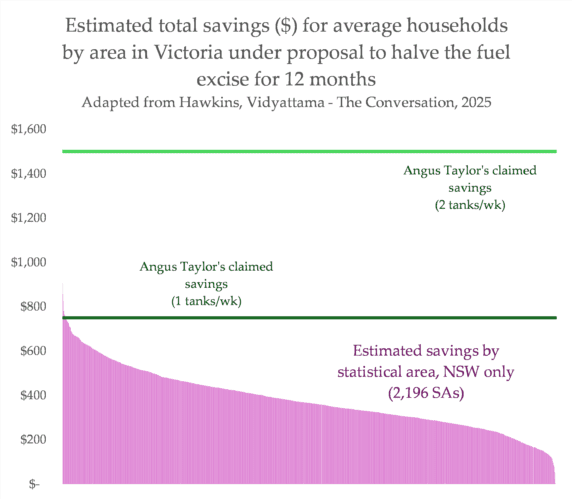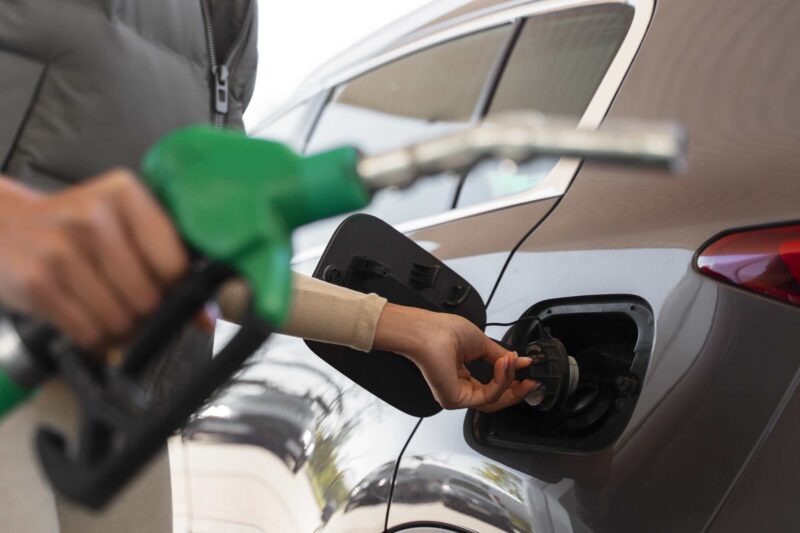I guess it was predictable, but the Coalition’s first instinct in replying to Labor’s recent budget announcements has been to lean hard on stronger government intervention to help encourage the use of fossil fuels.
Peter Dutton has plagiarised Scott Morrison and promised to cut the fuel excise, a tax levied on diesel and petrol. It’s collected from the producers or importers of fossil fuels, and passed onto consumers – and Dutton’s cut would only last twelve months. Business users of fossil fuelled vehicles receive a ‘fuel tax credit’ – three quarters of which go to the mining industry.
It is a bad policy in a wide range of ways. Perhaps the most immediately egregious is how badly they’ve exaggerated the savings. Matt Grudnoff and Greg Jericho from The Australia Institute show that the savings will be far less than promised, here.
Another rapid response analysis published in The Conversation shows that “cutting petrol prices is not a well-targeted way of helping those people doing it tough”. Angus Taylor claims savings of around $1,500 for two tanks a week and $750 for one, over the one year period the fossil tax is kneecapped.
But the analysis shows that”under Dutton’s proposal, the average inner-city household in Sydney, Melbourne, Brisbane and Adelaide will save around $270 over 12 months. The average outer suburban household in these cities will save $450″. I’ve adapted their data into the chart below:

Dutton is specifically choosing to target households most reliant on fossil fuelled transport, with this policy. People with greater access to transport or bike lanes, or able to purchase or rent an electric vehicle, will see zero benefit from these tax cuts. Even people driving smaller cars will see significantly less benefit. This is the consumer equivalent of a fossil fuel handout.
In fact, it seems incredibly likely that the indirect harm caused by huge, fuel-guzzling vehicles would significantly worsen the inequality. Large consumer utes and four-wheel drives cause harm through their climate pollution and air pollution, and they tend to cause serious pedestrian and cyclist safety risk.
Dutton’s effort to artificially preserve demand for combustion engine vehicles will likely result in a net cost to Australian society, rather than a benefit. The policy has also been met with skepticism from outlets that would normally default to supporting the Coalition.
Despite Labor having packed a litany of loopholes into the ‘National Vehicle Efficiency Scheme’ to allow for oversized vehicles, the Coalition is still going to use the threat of efficiency standards to repeat the car culture war they’ve run at previous elections, and it seems this targeted fuel-guzzler handout will be part of that.
In an interview with 2GB’s Ben Fordham, Dutton presents the scheme as “Albo’s tax on utes and cars”. Labor actively weakening the scheme to allow even more loopholes for large, luxury four wheel drives and utes doesn’t seem to have broken Dutton’s stride.
A policy like this will deepen reliance on combustion engine cars when Australia should be urgently moving away from them as fast as possible. It won’t deliver the promised savings, and chances are it’ll stick around for longer than twelve months.

Ketan Joshi has been at the forefront of clean energy for eight years, starting out as a data analyst working in wind energy, and expanding that knowledge base to community engagement, climate science and new energy technology. He writes for The Driven’s parent site, RenewEconomy, and has also written for the Guardian, The Monthly, ABC News and has penned several hundred blog posts digging into climate and energy issues, building a position as a respected and analytical energy commentator in Australia. He’s spoken at the Ethics Centre IQ2 debates on the need for urgent decarbonisation, he’s served as an subject matter expert on national television, and has a wide following on social media around energy and climate.

